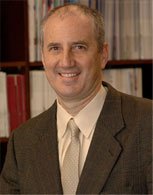Q and A with Dr Ted Trimble
January / February 2012 | Volume 11, Issue 1

Dr. Ted Trimble
Dr. Ted Trimble was recently named director of the National Cancer Institute's new Center for Global Health. Trimble has been recognized internationally as an expert in prevention, screening, treatment and symptom management for women with cervical, ovarian, uterine and other gynecologic cancers. Since joining NCI in 1991, he has led a national scientific program of treatment trials for gynecologic cancers and worked with colleagues worldwide to develop global research strategies for these diseases.
What's your vision for NCI's new Center for Global Health?
Today we have an unparalleled opportunity to decrease the global burden of cancer. There's a strong and growing awareness of the importance of global health and the need for us to work together to improve it. There's clear evidence of progress in controlling infectious diseases worldwide, thanks to coordinated approaches in basic research, translational research, clinical trials, implementation science and capacity building. This suggests that similar approaches will be useful for non-communicable diseases, including cancer. In addition, as much as 18 percent of cancers are caused by chronic infection. Progress in control of infectious disease has already had an impact on the incidence of some cancers linked to infection, such as liver cancer (hepatitis viruses), cervical cancer (human papillomaviruses), and stomach cancer (helicobacter pylori). As countries work to strengthen and streamline their health care systems, they recognize the value of integrating cancer prevention, screening, early diagnosis and treatment programs into routine clinical care. Enabling the open exchange of scientific knowledge is a critical goal in the fight against cancer.
What are your priorities?Our primary goal is to develop and implement plans to improve cancer prevention, screening and treatment globally. We're considering new areas of scientific focus and are working with our sister institutes and centers to expand our research networks, particularly in Latin America, Asia and Africa. We'd like to increase the range of our research globally in epidemiology and cancer genetics. NCI is also participating in an effort with our European colleagues to build the clinical trials infrastructure and reduce the amount of red tape involved. Finally, we'll maintain and strengthen research collaborations with our NIH partners, other U.S. government agencies, foreign governments, NGOs and the private sector to decrease the global burden of cancer.
What is the global burden of cancer?
In 2008, nearly 7.6 million people died from cancer worldwide. By 2030, the number of cancer deaths may be as high as 13.2 million due to population growth and aging. Of these deaths, more than 35 percent may be preventable by controlling tobacco use, diet, alcohol use and infection. In addition, screening for breast, cervical, and colorectal cancer combined with effective treatment can also prevent deaths from those diseases. Access to standard surgery, chemotherapy, radiotherapy and palliative care is problematic in many countries.
What role will partnerships play?
Partnerships are key to our plans for the Center. We intend to strengthen our dialogue with other NIH institutes and centers, particularly the Fogarty International Center. We want to help develop a global cancer research strategy with the CDC, nongovernmental organizations, and universities and cancer centers that have strong global health programs. We also plan to consult with the WHO and International Agency for Research on Cancer to coordinate global health programs for cancer control. In addition, the Center will work with pharmaceutical and biotechnology companies to help develop new, inexpensive diagnostic tools and figure out how to make novel cancer therapeutics available in a cost-effective manner to people in low- and middle-income countries.
How might Americans living with cancer benefit from your international collaborations?
There are many ways in which global cancer research can benefit cancer Americans living with cancer in the United States. For example, we can learn much faster about the impact of environmental and genetic factors upon the development of certain types of cancer when we study those cancers in regions with a very high incidence of the disease. The information we gain helps us develop strategies to prevent, screen for, and treat those same cancers in the United States. We can also learn from global collaborations how to improve prevention, screening, and treatment for many cancers which are common in the United States. By coordinating our research with international partners, we can also make progress in cancer research much faster, building on the investments in cancer research made around the world.
More Information
To view Adobe PDF files,
download current, free accessible plug-ins from Adobe's website.